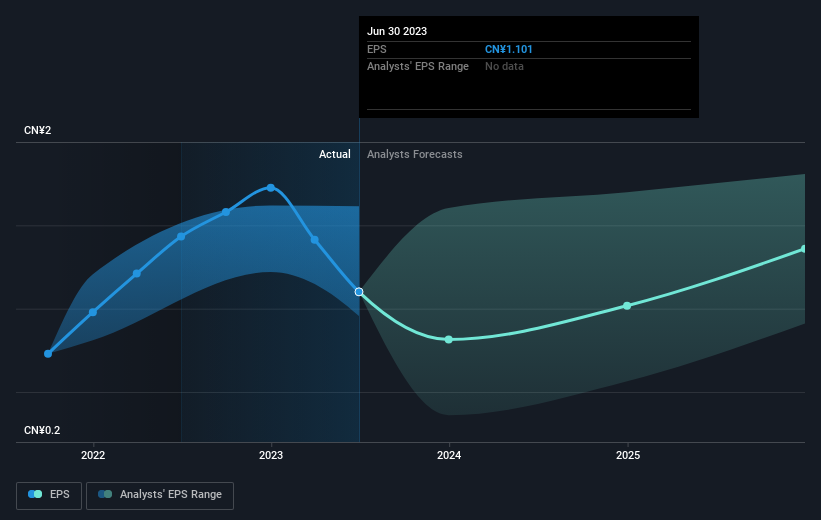Stock Analysis
Dongyue Group (HKG:189) stock falls 6.8% in past week as one-year earnings and shareholder returns continue downward trend

It's easy to match the overall market return by buying an index fund. But if you buy individual stocks, you can do both better or worse than that. Investors in Dongyue Group Limited (HKG:189) have tasted that bitter downside in the last year, as the share price dropped 31%. That falls noticeably short of the market decline of around 3.1%. The silver lining (for longer term investors) is that the stock is still 30% higher than it was three years ago. Furthermore, it's down 19% in about a quarter. That's not much fun for holders.
If the past week is anything to go by, investor sentiment for Dongyue Group isn't positive, so let's see if there's a mismatch between fundamentals and the share price.
Check out our latest analysis for Dongyue Group
While the efficient markets hypothesis continues to be taught by some, it has been proven that markets are over-reactive dynamic systems, and investors are not always rational. One way to examine how market sentiment has changed over time is to look at the interaction between a company's share price and its earnings per share (EPS).
Unfortunately Dongyue Group reported an EPS drop of 23% for the last year. The share price decline of 31% is actually more than the EPS drop. Unsurprisingly, given the lack of EPS growth, the market seems to be more cautious about the stock. The less favorable sentiment is reflected in its current P/E ratio of 4.65.
You can see how EPS has changed over time in the image below (click on the chart to see the exact values).

This free interactive report on Dongyue Group's earnings, revenue and cash flow is a great place to start, if you want to investigate the stock further.
What About Dividends?
It is important to consider the total shareholder return, as well as the share price return, for any given stock. The TSR incorporates the value of any spin-offs or discounted capital raisings, along with any dividends, based on the assumption that the dividends are reinvested. So for companies that pay a generous dividend, the TSR is often a lot higher than the share price return. In the case of Dongyue Group, it has a TSR of -25% for the last 1 year. That exceeds its share price return that we previously mentioned. This is largely a result of its dividend payments!
A Different Perspective
Dongyue Group shareholders are down 25% for the year (even including dividends), but the market itself is up 3.1%. Even the share prices of good stocks drop sometimes, but we want to see improvements in the fundamental metrics of a business, before getting too interested. Longer term investors wouldn't be so upset, since they would have made 11%, each year, over five years. It could be that the recent sell-off is an opportunity, so it may be worth checking the fundamental data for signs of a long term growth trend. While it is well worth considering the different impacts that market conditions can have on the share price, there are other factors that are even more important. Consider risks, for instance. Every company has them, and we've spotted 2 warning signs for Dongyue Group you should know about.
Of course Dongyue Group may not be the best stock to buy. So you may wish to see this free collection of growth stocks.
Please note, the market returns quoted in this article reflect the market weighted average returns of stocks that currently trade on Hong Kong exchanges.
Valuation is complex, but we're helping make it simple.
Find out whether Dongyue Group is potentially over or undervalued by checking out our comprehensive analysis, which includes fair value estimates, risks and warnings, dividends, insider transactions and financial health.
View the Free AnalysisHave feedback on this article? Concerned about the content? Get in touch with us directly. Alternatively, email editorial-team (at) simplywallst.com.
This article by Simply Wall St is general in nature. We provide commentary based on historical data and analyst forecasts only using an unbiased methodology and our articles are not intended to be financial advice. It does not constitute a recommendation to buy or sell any stock, and does not take account of your objectives, or your financial situation. We aim to bring you long-term focused analysis driven by fundamental data. Note that our analysis may not factor in the latest price-sensitive company announcements or qualitative material. Simply Wall St has no position in any stocks mentioned.
About SEHK:189
Dongyue Group
An investment holding company, manufactures, distributes, and sells polymers, organic silicone, refrigerants, dichloromethane, polyvinyl chloride (PVC), liquid alkali, and other products in the People's Republic of China and internationally.
Flawless balance sheet with reasonable growth potential.


